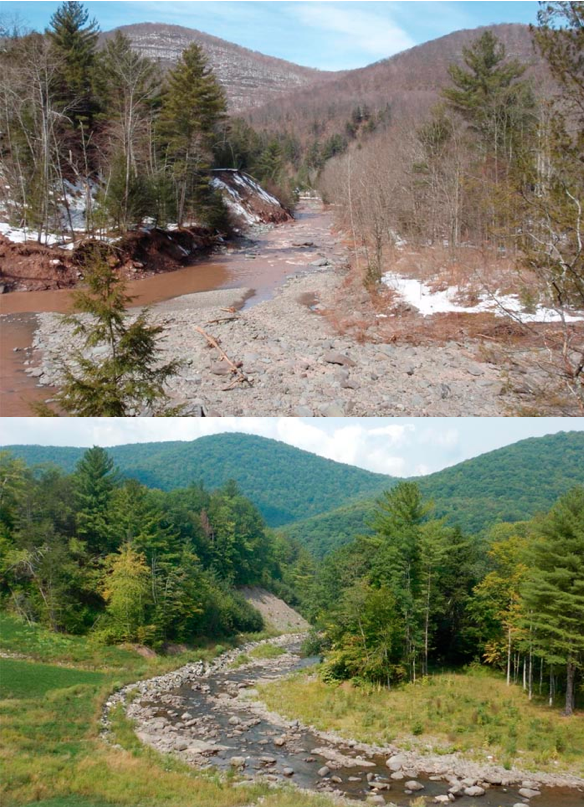Stony Clove Creek in New York, before restoration (top), and after. Photos courtesy of Hudson Valley One.
In 2011, when Hurricane Irene nailed the Atlantic coast, Stony Clove Creek near Chichester, N.Y., carried almost 16,000 cubic feet per second of water down its course, flooding the community and generally making a mess of things.
Years of erosion along Stony Clove Creek contributed a significant sediment load to nearby Esopus Creek, an important trout fishery in the region, and with every big rain event, the creek would blow out for days or weeks.
But, thanks to work done on the creek by state and federal agencies, with support from local Trout Unlimited members, the creek’s course has been restored to its natural state, and it runs much cleaner, even during big rains. A massive flood event like Irene hasn’t happened since the restoration work is complete, so there’s no telling how well the restored creek will drain during a destructive storm, but there are signs that Stony Clove Creek is healthy again.
According to TU volunteer Mark Loete, the creek is fishing better than in years past, and anglers are seeing a lot of smaller fish, meaning the trout in Esopus Creek are using Stony Clove Creek to spawn and rear.
The improved fishing is important to folks like Loete—that’s why we do what we do at Trout Unlimited. But restoring creeks like Stony Clove also make communities safer and more resilient to flooding. Everybody wins.
Here’s what else is happening in the TU universe:
- TU has long been a partner in the annual Fly Fishing Film Tour, and we’re involved again the planned 2019 presentation. But the F3T is under new ownership, having been sold recently to Active Interest Media’s Warren Miller Entertainment Group. According to show proprietors, not much will change. At this point, TU’s involvment won’t change, either. In 2018, the tour raised $500,000 for non-profits like TU, the Bonefish and Tarpon Trust and other nonprofits.
- In Colorado, the rare greenback cutthroat trout is now on display in a nature center along Bear Creek, where the fish was “rediscovered” after it was once thought to be extinct. Greenbacks raised in the federal fish hatchery outside of Leadville will now be a permanent part of the Bear Creek Nature Center, where visitor can learn more about the state fish of Colorado that TU and our partners have worked for years to reintroduce into their native range.
- Vermont’s famous Battenkill River continues to improve as restoration efforts by TU and our conservation partners continue to take hold.
- TU members in Massachusetts donated a customized raft to the Massachusetts Division of Fisheries and Wildlife that will help researchers with electoshocking work that’s done to collect data on local trout streams.
— Chris Hunt



